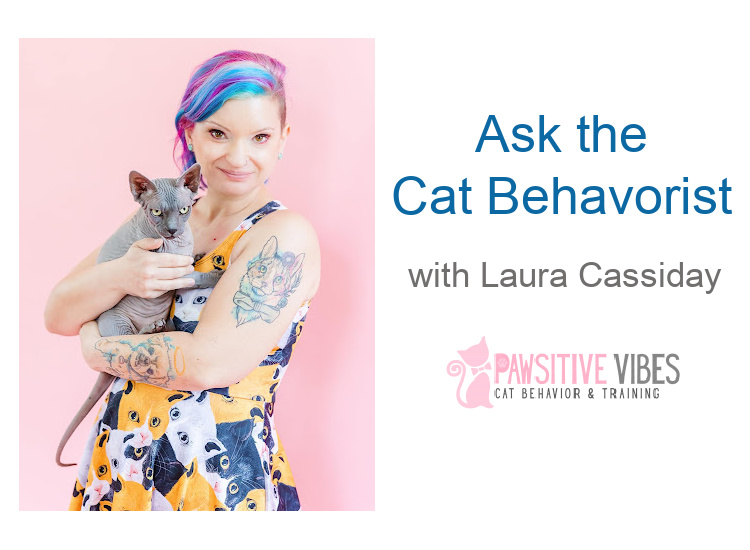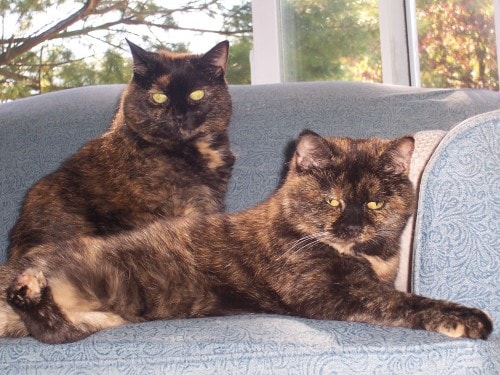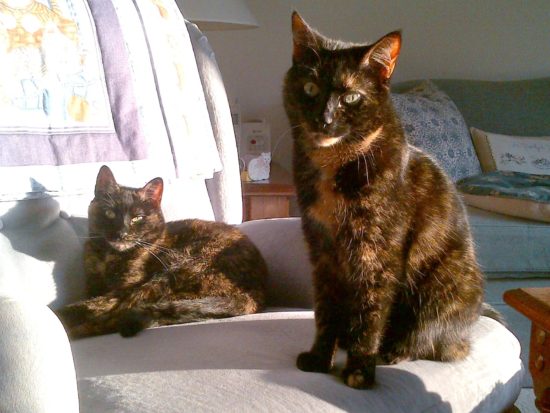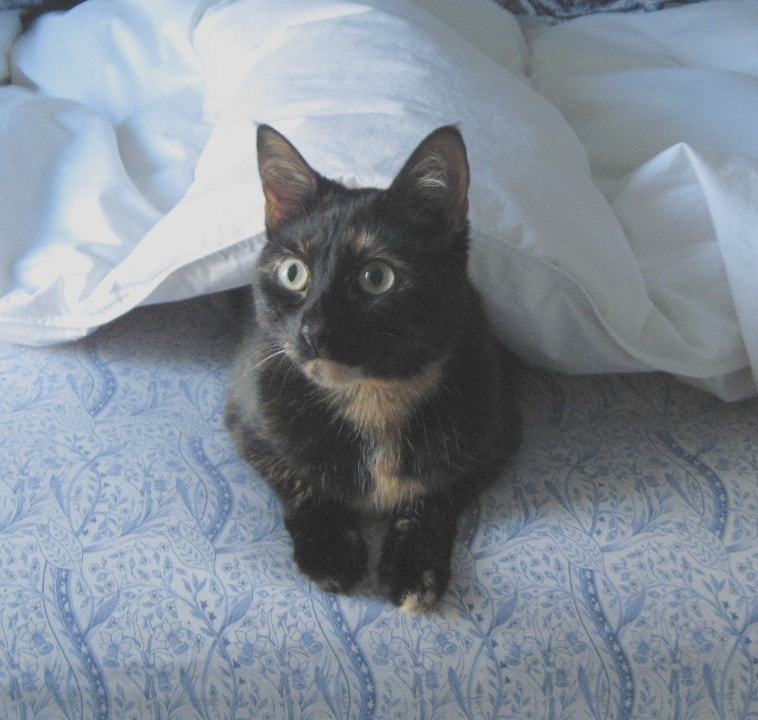
Laura Cassiday is a certified cat behavior consultant (CCBC) and owner of Pawsitive Vibes Cat Behavior and Training. Laura is certified through the International Association of Animal Behavior Consultants. She is also a Fear Free certified animal trainer. Laura recently published her first book, The Complete Guide to Adopting a Cat (affiliate link*.) She works with cat guardians remotely from all over the world, as well as in-person in her local area of Baltimore, Maryland. For more information, visit Pawsitive Vibes Cat Behavior and Training.
Do you have a question for Laura?
Leave it in a comment, and she’ll answer it next month!
Personality change after spay
I have one question that now just popped in my head. Is it normal for a just spayed female cat to act a little different after she’s healed? We got her spayed a while ago, but before she was, she meowed all the time and was very affectionate. She is still somewhat like this now but she meows a lot less and isn’t as affectionate to pettings (although I’d be lying if I said she wasn’t as affectionate still. Kind of though). I don’t know if this has to do with her not going through heat anymore or something else. Just curious! – Kristin
Thanks so much Kristin for getting your kitty spayed! I actually hear a ton of myths about spaying and neutering cats – that their personality will change or that they’ll become fat and lazy, to name a few. The good news is neither are true. What you’re probably seeing is a minor change in behavior from stress or pain. In some clinics (although we are getting much better overall) there is still a disregard for or lack of proper pain management for cats after surgery. It’s common for cats to be sent home from a spay or neuter with no pain medication at all. I think this tends to be because cats are very stoic and don’t tend to show pain, so it’s assumed that they’re “just fine.”
Cats are unique in that they are both predators and prey animals. The prey animal in them knows that they’ll be eaten if they show signs of weakness, so they evolved to be able to hide any pain or illness very well. Instead, what you’ll see sometimes is like what you’ve described: just a minor behavior change or feeling “off” in some way. Hopefully by now she’s feeling good and back to her normal self!
Going through heat can also make cats seem more affectionate, so if she’s been through a couple of cycles, you may not see that needy and ultra-affectionate behavior from her anymore. Rest assured, she still loves you, and you’ve made her much more comfortable!
Change in household dynamics
I had six cats. Lost two last year within two months and had another very sick cat I thought would go first and he made it till February of this year. Ever since Tubby and Cashew passed, the others pick on each other. Each one went through their own grief. Hope charges after Jake and Garfield. Then Jake won’t leave Garfield alone, mostly when it’s dark. Garfield is 14 and doesn’t care for it. He was Cashew’s friend. He mostly tolerates the others. I have tried separating them, time outs, playing with them. I do not know what to do anymore. Any suggestions? – Sue
Sorry for the loss of all your kitties. It’s always tough to go through a period of loss like you, and your other cats, have experienced. It’s fairly common to see a change in the dynamics of the household after one or several cats pass away. Cats do tend to naturally develop a hierarchy within a group, and this hierarchy can be upset with the loss or addition of a cat. If you are experiencing territorial aggression between your cats, which due to the timing of the fighting beginning is likely what is happening, the best thing you can do is environmental management. What does this mean?
When you are experiencing conflict between cats, the most common reason is competition over resources. A resource is anything important to your cat, such as food, water, scratching posts, beds, litter boxes, toys, etc. Providing multiple, separate resources to your cats in a way that spreads them out throughout the home can reduce tension and fighting. Many cat owners tend to “clump” their cats’ things together. They’ll have a “cat room” that contains all or most of the litter boxes, and sometimes even the food and water. This encourages all the cats to cluster together, be on top of each other, and ultimately get into arguments.
Think about promoting avoidance. Make it easy for the cats to ignore each other and spend time in different areas in the home. Cats will often have smaller, separate territories inside the house they’ll claim as their own. For example, one cat always sleeps on the couch in the afternoon. The other cats learn not to occupy that spot at that time. To reduce any possible fighting, multiple other resting areas should be provided in the room, as well as in the other main rooms of the house. If all the cats want a comfortable place to rest at the same time, they should have multiple, equally desirable options.
Remember that you are also a resource to your cats. You may see conflict and tension particularly when you are around, as they all want to be near you at the same time and there’s only one of you! Individual attention and playtime is also a good idea to make sure everyone is getting what they need.
If fighting persists or gets worse, a full reintroduction may be necessary, where the cats are separated and slowly reintroduced to each other as if they had never met before. Hopefully it doesn’t come to that. Good luck!






Hi Laura!
This column has always been so helpful and I wanted to welcome you and thank you for the wonderful information that you pass along. I work at a cat rescue and we house our cats in small rooms with catios.
I wanted to ask about a cat in particular that we have taken in from another rescue – he was returned to them twice due to his behavior that involves “grabbing” peoples arms/legs with both his claws and teeth. He often just grabs on and then pretty quickly lets go – but hard enough to leave marks.
he is only about 2 years old, is very active and gets overstimulated quickly. We have had him about months and have worked extensively with him -interactive play, scent work, clicker training where we have tried to direct his attention to the toys vs body parts and we always bring a shield in his room just to be able to cover any body parts he might go after. he did great in the beginning and loved play time and improved to where he would relax on the couch with a visitor and snuggle with them- although we still had a number of incidents where he would get around the shield on volunteers and grab them.
But things have changed and now he often seems to be disinterested in play – often preferring to hump his pillow instead.
We even have an outdoor play yard that he gets to enjoy once or twice a week – but even when he is outdoors and running off his energy he has run at people and “grabbed” them.
So I want to ask if you have any ideas on how we can further work with him to change this grabbing behavior – we can often see it coming on – he seems overstimulated and paces around and rubs on everything and just can’t focus or settle.
and possibly how we can get him motivated to play once again – we’re thinking he’s probably bored but his behavior also makes it difficult to find the right adopter for him.
Thank you!
Household of five cats, four females, one male. Six litter boxes and enough areas to climb and/or “hide.” Female cat #2, age 5 yrs with no current UTI or crystals and on a Urinary S/O food. Keep litter boxes clean but she’ll pee in the box, outside the box, and in other areas of the house. Not a new behavior but also not a behavior the first few years of her life. She prefers to hang out on her cat tree and doesn’t socialize much with the other cats. Currently trying Prozac but that doesn’t seem to be helping. I’d love to know what other options to consider because pee hide and seek is not a game I want to continue to play.
Hi Laura
I have two Siberians that will be 2 years old next month. I live in South Florida and I have a vacation home in North Carolina. Every time we go to North Carolina I have a pet sitter come and stay overnight with my cats for that length of time. However we would like to go for longer Stays and I want to bring my kittens with me. How can I get them used to traveling in the summers and feeling comfortable in the other home? I would appreciate any advice you can give me. Thank you so much
Thank you so much for answering my question Laura! And yes, she is back to normal by now. I was just curious why that came and went, especially since we’re getting our 1 other female car spayed soon as well! Thanks again!
Yup, I’m definitely getting my CAR spayed! I meant cat!
Hi Laura, I have a weird question. My cat Lulu has had a change of personality recently. It all started when my older cat had a poopy butt and my husband held her while I washed her backside. Lulu seemed very curious about what was going on but we wouldn’t let her close enough to look. She would have just been in the way. When we were done cleaning Pele’s rear, I set her down and Lulu attacked her. Then she went after Kiki. Kiki and Pele hid under the bed for hours after that. Now Kiki and Pele are scared of Lulu. They avoid walking past her and won’t eat with her. It’s like that one instance changed her entire personality from the sweet, mellow cat to a bully. How can I find peace again with my girls.
Thank you so much.
My question for Laura Cassiday is: My two cats are a 6 year old spayed female and a 5 year old neutered male who have been together for 3 years. They are bonded. About 7 months ago, my female (out of the blue) started meowing 2-3 per night – every night and leaving toy mice on the carpet for the male. The first week (when she cried) he came running. Now he doesn’t – and he doesn’t care about the mice. If ignored, the female’s meows get louder and louder until my husband and I go into the living room to quiet her down.
We can’t figure out why she started to do this, but we have no idea how to address this, if at all possible. Any suggestions?